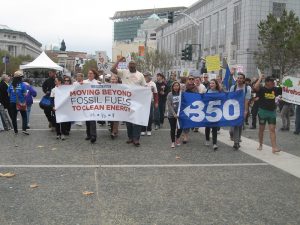“The pandemic has shown that governments can rapidly mobilize massive sums of public money,” says one campaigner. “This is the moment to do it, and accelerate the transition.”
By Brett Wilkins Published 5-19-2022 by Common Dreams

Clean energy advocates march in an anti-fossil fuel protest in San Francisco. (Photo: Greenbelt Alliance/flickr/cc)
More than 120 civil society groups from around the world on Thursday warned that nations have only six months left to meet a collective commitment made at last year’s United Nations Climate Conference to end public financing of fossil fuels.
The organizations detailed steps nations must take as soon as possible to comply with their obligations under the Glasgow Statement on International Public Support for the Clean Energy Transition, a product of last year’s COP26 summit.
The 39 nations and financial institutions that signed the statement promised to end “direct public support” for the fossil fuel sector by the end of 2022, “except in limited and clearly defined circumstances that are consistent with a 1.5°C warming limit and the goals of the Paris Agreement.”
Letters were sent Thursday to leaders of Canada, Germany, Netherlands, Italy, France, Portugal, and New Zealand. U.K. and U.S. leaders previously received similar letters; the groups will soon write to the governments of Costa Rica and El Salvador. Collectively, letters have been signed by over 500 groups.
“The Glasgow statement has the potential to directly shift at least $24 billion a year in influential trade and development finance from governments away from oil, gas, and coal towards the clean energy transition if it is implemented well—and much more if these initial signatories can convince peers to join them and bring their commitment into other multilateral settings like the G7 and OECD,” Oil Change International, which signed the letters, said.
BREAKING 🚨 122 CSOs are warning signatories of the Glasgow public finance statement they have just 6 months left to follow through on their commitment to end international public finance to ALL fossil fuels 👉 https://t.co/hoanjcXDHl#StopFundingFossils pic.twitter.com/45sDnIxLgw
— Oil Change International (@PriceofOil) May 19, 2022
The letter addressed to U.S. President Joe Biden urges him to “seize this moment to end our dependence on fossil fuels by building an equitable, just, and renewable energy system for all.”
Noting the “cascade of emergencies” faced by humanity, the message urges Biden to stop supporting the fossil fuel industry, which causes “air, soil, and water pollution, species extinction, and biodiversity crises,” as well as wars “driven by our collective dependence” on oil, and “enormous ecological destruction,” while entrenching “global systems of colonialism, racism, and ecocide.”
“Fossil fuels are also the primary driver of the climate crisis and sow the destruction captured in the United Nations report from the Intergovernmental Panel on Climate Change,” the letter continues. “The International Energy Agency showed that the world must immediately stop all new fossil fuel investments to meet the survival target for many vulnerable and poor communities, island nations, and fragile ecosystems.”
Kate DeAngelis, international finance program manager at letter signatory Friends of the Earth U.S., said in a statement that “President Biden started his presidency with bold statements on the need to end overseas fossil fuel financing, but has spent the past year taking little real action. Rather than using this moment to cave to the oil and gas industry, the Biden-Harris administration must end U.S. financing for international fossil fuels and promote a sustainable, renewable energy future.”
Oil Change International communications campaigner Nicole Rodel noted that while “Russia’s war in Ukraine and the current fuel prices spikes have prompted some Glasgow statement signatories to suggest they may backtrack and use their international public finance to lock in new fossil infrastructure,” countries should eschew falling back on dirty energy.
“What is desperately needed instead is for global leaders to double down on the Glasgow statement and support rapid decarbonization packages for renewables and energy efficiency in the areas that need it most,” Rodel stressed. “The pandemic has shown that governments can rapidly mobilize massive sums of public money. This is the moment to do it, and accelerate the transition to a clean and fair future without fossil-fueled conflict.”

